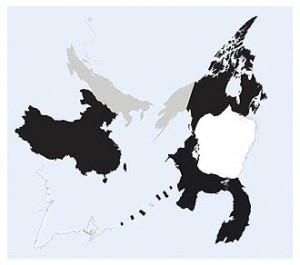
“There’s a scholar who talks about ‘heart’s ease,’ ” Albrecht told me as we sat in his car on a cliff above the Newcastle shore, overlooking the Pacific. In the distance, just before the earth curved out of sight, 40 coal tankers were lined up single file. “People have heart’s ease when they’re on their own country. If you force them off that country, if you take them away from their land, they feel the loss of heart’s ease as a kind of vertigo, a disintegration of their whole life.” Australian aborigines, Navajos and any number of indigenous peoples have reported this sense of mournful disorientation after being displaced from their land. What Albrecht realized during his trip to the Upper Valley was that this “place pathology,” as one philosopher has called it, wasn’t limited to natives. Albrecht’s petitioners were anxious, unsettled, despairing, depressed — just as if they had been forcibly removed from the valley. Only they hadn’t; the valley changed around them.
In Albrecht’s view, the residents of the Upper Hunter were suffering not just from the strain of living in difficult conditions but also from something more fundamental: a hitherto unrecognized psychological condition. In a 2004 essay, he coined a term to describe it: “solastalgia,” a combination of the Latin word solacium (comfort) and the Greek root –algia (pain), which he defined as “the pain experienced when there is recognition that the place where one resides and that one loves is under immediate assault . . . a form of homesickness one gets when one is still at ‘home.’ ” A neologism wasn’t destined to stop the mines; they continued to spread. But so did Albrecht’s idea. In the past five years, the word “solastalgia” has appeared in media outlets as disparate as Wired, The Daily News in Sri Lanka and Andrew Sullivan’s popular political blog, The Daily Dish. In September, the British trip-hop duo Zero 7 released an instrumental track titled “Solastalgia,” and in 2008 Jukeen, a Slovenian recording artist, used the word as an album title. “Solastalgia” has been used to describe the experiences of Canadian Inuit communities coping with the effects of rising temperatures; Ghanaian subsistence farmers faced with changes in rainfall patterns; and refugees returning to New Orleans after Katrina.
Phi Beta Iota: Seriously good stuff that comes at the same time that human feelings and emotions are being recognizes as co-intelligence to the science and humanities and (more or less moribund) social sciences. It's about the Whole.




 HACKERS ON PLANET EARTH (HOPE)
HACKERS ON PLANET EARTH (HOPE) Phi Beta Iota: Hackers are like astronauts, pushing the bleeding edge of the envelope. If the US Government had listened to us in 1991-1994, cyberspace would be secure today, and we would not be spending $12 billion a year on the cyber-scam game–outsourcing to beltway bandits fighting for the 100 folks that actually know how to do this stuff and can qualify for clearances. Our solution for the regional networks is gong to be multinational and open everything. This event is specifically recommended for young teens who show signs of intelligence and curiosity, and for mid-career officers beginning to realize that 80% of what they do is without merit, seeking a better way. This is where we do the right things righter, not the wrong things righter.
Phi Beta Iota: Hackers are like astronauts, pushing the bleeding edge of the envelope. If the US Government had listened to us in 1991-1994, cyberspace would be secure today, and we would not be spending $12 billion a year on the cyber-scam game–outsourcing to beltway bandits fighting for the 100 folks that actually know how to do this stuff and can qualify for clearances. Our solution for the regional networks is gong to be multinational and open everything. This event is specifically recommended for young teens who show signs of intelligence and curiosity, and for mid-career officers beginning to realize that 80% of what they do is without merit, seeking a better way. This is where we do the right things righter, not the wrong things righter.
